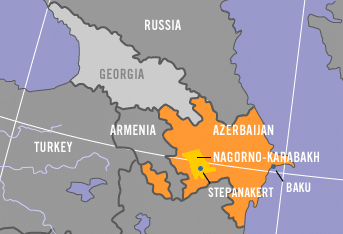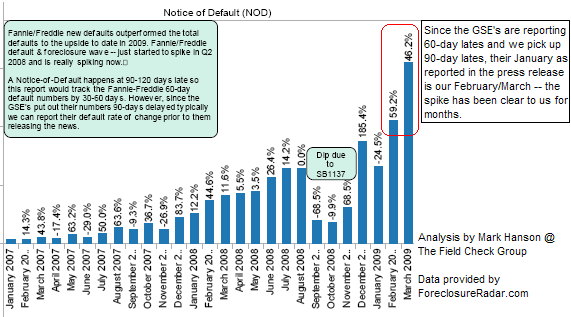Denise Grady and Alan Cowell at the New York Times report that the World Health Organization yesterday raised its alert level on the swine flu to 5, or "sustained community-level outbreaks in at least two countries--a signal that a pandemic is imminent." 5 is just below the highest alert level, 6, which indicates that a global pandemic in underway. Phase 5 activates an intense effort to develop a vaccine. Mark Stevenson and Andrew O. Selsky at the Associated Press report that Mexico has responded by shutting non-essential services for five days and urging businesses to stay closed and citizens to stay home during that time.
"'It really is all of humanity that is under threat during a pandemic,' WHO Director General Margaret Chan said in Geneva. 'We do not have all the answers right now, but we will get them.'Fort Worth, Texas, announced the temporary closure of all school districts to last through May 12, and dozens of schools have been closed across the country. From the New York Times story:
Switzerland and the Netherlands became the latest countries to report swine flu infections. In addition to Mexico and the US, Canada, New Zealand, Britain, Germany, Spain, Israel and Austria have confirmed cases."
"Most people will not have immunity to this new virus and, as it continues to spread, more cases, more hospitalizations and more deaths are expected. And as the virus spreads, the likelihood grows that it will mutate--possibly into [a] more lethal strain."Jane Rickards at the Washington Post reports that Beijing gave the green light for Taipei to officially be invited to the WHO's 62nd World Health Assembly, which begins May 18 in Geneva.
"Experts on relations between Taiwan and the mainland said they believed the two sides had been secretly negotiating the matter for months.Donald G. McNeil Jr. at the New York Times reports that Homeland Security Secretary Janet Napolitano was heavily pressured by Congress to officially close the border with Mexico, although at this stage experts do not believe the outbreak is containable via quarantines.
'They're finding a way to accept each other,' said Andrew Yang, secretary general of the Chinese Council of Advanced Policy Studies. 'This will provide room for more positive negotiations for future international participation.'"
"Closing borders is dangerous because many goods needed in a pandemic are made abroad, said Dr. Michael T. Osterholm, director of the Center for Infectious Disease Research and Policy at the University of Minnesota, including most masks, gowns and gloves, electrical circuits for ventilators and communications gear, and pharmaceutical drugs and the raw materials to make them. ...Further, Mexico has the third largest share of trade with the US, after Canada and China, per the US Census Bureau's foreign trade statistics. It roughly accounts for $350 billion in trade per annum. Kyle Peterson at Reuters notes that "US Commerce Department data shows about 5.9 million US citizens flew to Mexico in 2008." Total global tourism receipts account for about 9% of global GDP, according to 2008 Travel and Tourism Economic Research of the World Travel & Tourism Council (WTTC). Wikipedia's article on tourism indicates that the US is the third most visited country in the world and that Mexico is the tenth-most. Platts reports that Mexico's state oil company, PEMEX, will remain in operation during the suspension of non-essential services. Thus, until this outbreak is contained, it will add to the global economic downturn, with exports likely to be hit hardest, on top of the already dismal numbers continuing to be posted as per Rebecca Wilder's weekly roundup of global economic data:
'You cut those off and you cripple the health care system,' he said. 'Our global just-in-time economy means we are dependent on others.' Much of our food is from overseas. 'A Kellogg’s Nutri-Grain bar has ingredients from nine countries in it,' he noted."

Global instability could thus potentially sharply increase. Though this particular outbreak is not reportedly as dangerous as the 1918 Spanish Flu, be safe. Apparently the most practical actions you can take are to wash your hands with soap regularly and attempt to limit social interaction.
2. JAPANESE INDUSTRIAL OUTPUT UP 1.6% IN MARCH, BUT ASIAN SPOT LNG DOWN $0.30/MMBTU
Hiroko Tabuchi at the New York Times reports that Japanese industrial output grew by 1.6% in March from the month earlier. The rise follows 10.2% and 9.4% declines in January and February, respectively. "Other recent economic data show a brightening picture. Exports in March rose 2% from the previous month, the first increase in nearly a year." Meanwhile, Jonty Rushforth at Platts reports that Asian spot LNG prices fell by $0.30/MMBtu to $3.80/MMBtu on April 30, per Platt's June Japan Korea marker. Several suppliers have cut production in the face of excess supply in the region, but apparently supplies remain more than abundant. A considerable share of LNG demand is for industrial production.
3. SIGNS OF DEFLATION IN THE UK; SOUTH AFRICA'S RESERVE BANK CUTS BENCHMARK INTEREST RATE
Angela Monaghan and Edmund Conway at the UK Telegraph report that UK weekly wages fell at an annual rate of 5.8% in February, the steepest decline in wages seen in 60 years. (h/t Yves Smith at naked capitalism.) Evidently Pretoria's inflation expectations are also for it to slow, as Nasreen Seria and Mike Cohen at Bloomberg report South Africa's Reserve Bank has cut its benchmark interest rate by a full percentage point to 8.5%.
"'Despite the widening output gap, inflation remains sticky but is expected to continue on its downward path,' [Bank Governor Tito Mboweni] said. 'The most recent central forecast of the bank shows a near-term deterioration in the inflation outlook.'4. MOSCOW ARRANGES FOR DEFENSE OF GEORGIAN BREAKAWAY REGIONS' BORDERS, BUT EVIDENTLY IS REBUFFED ON BP'S SHARE OF THE CPC PIPELINE
The Reserve Bank expects inflation to average 5.4% in the final quarter of 2010. Mboweni didn’t say today whether the inflation rate will drop into the target range this year, as he forecast last month."
The Associated Press reports that Russia signed a deal with South Ossetia and Abkhazia officially authorizing Moscow to defend their borders. Georgian President Mikhail Saakashvili condemned the deal, telling reporters in Poland:
"We are seeing some kind of legal maneuvering to try to legalize, but you cannot legalize something that is fundamentally illegal. It is very dangerous to everybody, including Russia itself."

Meanwhile, Amanda Rayborn at Platts reports that KazMunaiGaz has purchased BP's stake in the CPC pipeline for $250 million, apparently denying Lukoil's application to purchase the stake--see Daily Sources 4/14 #7.

5. US ECONOMIC DATA MIXED, SOME SEE 'GREEN SHOOTS'
Kelly Evans at Real Time Economics reports that the Labor Department's data on initial unemployment claims fell by 14,000 to 631,000.
"This is still a high level, of course, but the four-week average of new claims--which smoothes out weekly volatility--also declined, to 637,250."However, Evans notes:
"The total number of workers receiving jobless benefits jumped to nearly 6.3 million for the week ended April 18, a far higher figure than has been previously recorded by the Labor Department. With such high levels of workers on jobless rolls, it could keep a lid on any hopes for a recovery, particularly as the unemployment rate, now 8.5%, is expected to hit double digits."Meanwhile, Jeannine Aversa at the Associated Press reports that unemployment rates have risen for the third straight month in all the nation's largest metropolitan areas in March.
"In Wednesday's metro unemployment report, the government said 18 regions registered jobless rates of at least 15%. Meanwhile, 15 regions had rates below 5%. They include: Ames, Iowa; Houma-Bayou-Cane-Thibodaux, La.; Iowa, City, Iowa; Manhattan, Kansas; and Lubbock, Texas."Nonetheless, Phyllis Plitch at Real Time Economics reports that Dow Jones new economic sentiment indicator showed a small upturn in April to 27.6 in April, from 26.3 in March. It had bottomed at 22.2 in November.
"[The new economic sentiment indicator] is reported on a scale of 0 to 100, where higher numbers represent increasingly positive sentiment. In back-testing to 1990, the ESI has proven reliable in identifying nearly every major economic downturn and recovery as they happened, often in advance of other major economic indicators.The full statement following Fed's Open Market Committee meeting for April was posted on Real Time Economics yesterday, and it suggests that inflation remains subdued. Key excerpt:
Other recent sentiment indicators have suggested the US economy is starting to rebound. The Dow Jones ESI, however, is more cautious. In April, the ESI remained well below where it bottomed during the previous two recessions and has so far only crept off last November’s lows. This suggests the economy continues to contract, albeit at a significantly slower pace."
"Information received since the Federal Open Market Committee met in March indicates that the economy has continued to contract, though the pace of contraction appears to be somewhat slower. Household spending has shown signs of stabilizing but remains constrained by ongoing job losses, lower housing wealth, and tight credit. Weak sales prospects and difficulties in obtaining credit have led businesses to cut back on inventories, fixed investment, and staffing. Although the economic outlook has improved modestly since the March meeting, partly reflecting some easing of financial market conditions, economic activity is likely to remain weak for a time."Providing some support to the housing market and thus the economy overall are 30 year fixed rate mortgages which have fallen to 4.78% in the week ended April 30, the lowest seen since Freddie Mac began tracking the rate in 1971, per David Wessel at Real Time Economics.













